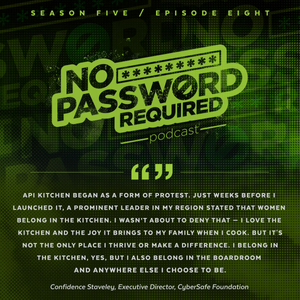
No Password Required
Cyber Florida
All episodes
Best episodes
Top 10 No Password Required Episodes
Goodpods has curated a list of the 10 best No Password Required episodes, ranked by the number of listens and likes each episode have garnered from our listeners. If you are listening to No Password Required for the first time, there's no better place to start than with one of these standout episodes. If you are a fan of the show, vote for your favorite No Password Required episode by adding your comments to the episode page.
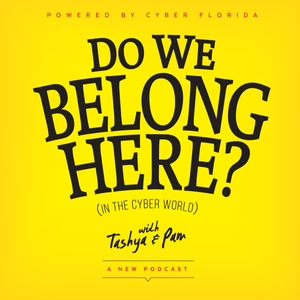
Mari Galloway: From Cyber Novice to Cyber Ninja
No Password Required
12/26/24 • 61 min
Mari Galloway, CEO of the Women’s Society of Cyberjutsu, is a woman whose magnetic presence ignites every room she enters. Her power radiates in an undeniable way through her hair, attire, and unwavering confidence, and the Do We Belong Here team wanted to know - did her light always shine this bright or did she work to cultivate it over time?
In this episode of Do We Belong Here, Tashya Denose and Pam Lindemoen speak with Mari about how she got “stuck” in the cyber world, eventually leading her to working in Vegas with the biggest casinos in the world. As they navigate through her experiences, the trio reflects on the adage that what happens in Vegas doesn't always stay in Vegas, especially in the realm of cybersecurity.
The discussion explores Mari’s evolution of self-confidence as she reflects on the challenges of being a trailblazing black woman in a predominantly male-dominated field. They also dive deep into Mari’s chapter of “Securing Our Future” by the Black Women in Cyber Collective and explore the pivotal role of finding your community in fostering resilience and self-empowerment.
Women’s Society of Cyberjutsu - womenscyberjutsu.org
Connect with Mari on LinkedIn - linkedin.com/in/themarigalloway/
Find us on social media - @DoWeBelongPod
Learn more about Cyber Florida - cyberflorida.org
Watch the podcast on YouTube: youtube.com/@cybersecurityfl
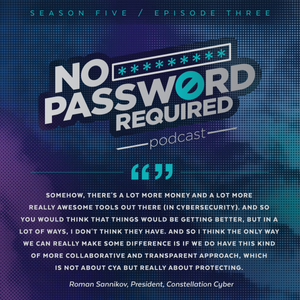
No Password Required Podcast Episode 48 — Roman Sannikov
No Password Required
03/26/24 • 65 min
Summary
Roman Sanikov, is the president of Constellation Cyber and specializes in cyber threat intelligence. In this episode, Roman discusses the importance of collaboration and transparency in the cybersecurity industry, particularly in combating ransomware attacks. He also emphasizes the need for a holistic approach to cybersecurity, involving education and empowerment for both employees and consumers. In this episode, Roman Reinhart shares his experiences as an undercover agent in the cybercrime world. He discusses maintaining a persona, dealing with forum behavior, and memorable arrests. He also emphasizes the importance of redemption and second chances. Roman also talks about his involvement with Helpster USA, an organization dedicated to providing life-saving treatment to young people in developing economies. He shares his hobbies of mushrooming and highlights the satisfying moments at work. Finally, he reflects on the cultural differences he experienced after moving overseas.
Takeaways
- Pig butchering schemes are a significant cause of financial losses globally, and it is important to approach the topic with compassion and nuance.
- Many scammers involved in these schemes are forced into this life against their will, either through human trafficking or being lured into it with false promises.
- Collaboration and transparency are crucial in the cybersecurity industry to effectively combat ransomware attacks and mitigate their secondary and tertiary impacts.
- A holistic approach to cybersecurity, involving education and empowerment for employees and consumers, is necessary to create a more secure environment. Maintaining a persona in the cybercrime world requires careful observation and adaptation.
- Memorable arrests can lead to redemption and second chances for individuals involved in cybercrime.
- Helpster USA provides life-saving treatment to young people in developing economies.
- Mushrooming is a rewarding hobby that allows for outdoor exploration and collection.
- Satisfying moments at work include helping clients have eureka moments and making positive changes.
- Cultural differences, such as politeness, can take time to understand and adapt to.
Chapters
00:00 Introduction to Pig Butchering Schemes (opening conversation)
02:18 Online Scams and Exploitation
03:41 Forced Labor and Human Trafficking
04:41 Approaching Scams with Compassion
05:39 Guest Introduction: Roman Sanikov
07:01 Roman's Role at Constellation Cyber
08:22 Promoting Transparency in Ransomware Incidents
10:17 Mitigating Secondary and Tertiary Impacts of Ransomware Attacks
11:14 The Ripple Effect of Ransomware Attacks
13:10 The Importance of Collaboration in Cybersecurity
14:58 Roman's Career Path and Background
19:34 Educating and Empowering Employees and Consumers
21:28 Avoiding Victim-Blaming in Cybersecurity
24:16 The Need for Collaboration and Transparency in the Industry
25:10 Balancing Non-Traditional Pursuits with College
26:37 Undercover Work and Building Relationships
33:07 Maintaining a Persona
36:25 Dealing with Forum Behavior
38:18 Memorable Arrests
41:25 Redemption and Second Chances
45:13 Helpster USA
48:16 Eccentricities of NHL Players
50:56 Life's Unexpected Moments
56:19 The Joy of Mushrooming
58:43 Satisfying Moments at Work
01:01:04 Learning Politeness in America
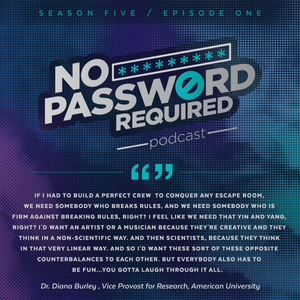
No Password Required Podcast Episode 46 — Dr. Diana Burley
No Password Required
01/31/24 • 58 min
SummaryThe conversation discusses the arrest of Ola Segun Simpson Adagorin, a Nigerian national facing US federal charges for a business email compromise scheme. The collaboration between the FBI and Ghana is highlighted, along with the role of the legal attache job in solving crimes with international impact. The scheme and indictment details are explored, emphasizing the sophistication of the attack. Dr. Diana Burley, Vice Provost for Research and Innovation at American University, shares insights on cybersecurity education and workforce readiness. The importance of understanding human behavior in cybersecurity is discussed, along with strategies for engaging in conversations and addressing the search for cyber unicorns. In this episode, the importance of password security and the various methods to enhance it are discussed. The conversation covers common password mistakes, the use of password managers, multi-factor authentication, biometric authentication, and the future of password security.
Takeaways
- Collaboration between law enforcement agencies is crucial in solving cybercrime cases with international implications.
- Understanding human behavior is essential in addressing cybersecurity challenges and shaping effective policies.
- Digital literacy and foundational cybersecurity skills should be integrated into education across disciplines.
- Creating a culture of cybersecurity requires a balance between rules and creativity, and a focus on psychological safety.
- Engaging in conversations with strangers can be facilitated by finding common interests and making personal connections. Create strong and unique passwords for each online account.
- Avoid common password mistakes such as using personal information or easily guessable patterns.
- Consider using a password manager to securely store and generate passwords.
- Enable multi-factor authentication whenever possible for an added layer of security.
- Biometric authentication, such as fingerprint or facial recognition, can provide convenient and secure access to devices and accounts.
- Passwordless authentication methods, such as biometrics or hardware tokens, may become more prevalent in the future.
- Stay informed about emerging technologies and best practices in password security.
Chapters
00:00 Introduction and Arrest of Ola Segun Simpson Adagorin
01:24 Collaboration between FBI and Ghana
03:15 Scheme and Indictment Details
04:44 Legal Attache Job and Collaboration
06:10 Deterrence and Sealed Indictments
07:36 Introduction of Dr. Diana Burley
08:31 Dr. Burley's Background and Role at American University
09:23 Interest in Cybersecurity and Technology
10:21 American University's Role in Educating Policymakers
12:15 Engaging with Leaders and Shaping Policy
13:36 Engaging with Students and Future Leaders
14:28 American University's Focus on Policy and Research
15:27 Misconceptions about the Cybersecurity Workforce
16:23 Digital Literacy and Foundational Cybersecurity Skills
18:45 Retaining Skilled Members in the Academic Environment
19:43 Benefits of Engaging as a University Faculty Member
20:37 Understanding Human Behavior in Cybersecurity
22:05 Insights from Research on Human Behavior
23:25 Understanding Employee Behavior in Cybersecurity
24:47 Creating a Culture of Cybersecurity
27:08 Strategies for Initiating Conversations with Strangers
31:50 The Cyber Unicorn Project
35:08 Addressing the Search for Cyber Unicorns
41:45 Lifestyle Polygraph
50:57 Understanding Irrational Behavior and Self-Awareness
53:37 Engaging in Conversations with Strangers
02:30 The Importance of Password Security
10:15 Common Password Mistakes
18:45 Password Managers
27:10 Multi-Factor Authentication
35:40 Biometric Authentication
44:20 Passwordless Authentication
52:30 Future of Password Security
58:21 Conclusion
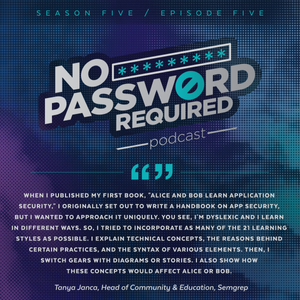
No Password Required Podcast Episode 50 — Tanya Janca
No Password Required
05/28/24 • 60 min
Summary
The conversation discusses the extradition case of Julian Assange and the role of the US prison system in the decision. It also explores Tanya Janca's role at Semgrep and her passion for affordable cybersecurity education. Additionally, it touches on Tanya's experience in election security and the importance of transparency in the process. Tanya discusses her volunteer work with the Canadian government, where she helps educate students about cybersecurity. She talks about the importance of teaching young people about privacy, protecting digital devices, and understanding cyber threats. Tanya also mentions her involvement in the Cyber Titan competition and her efforts to promote cybersecurity as a career. She shares her experience writing the book 'Alice and Bob Learn Application Security' and her unique approach to making technical concepts accessible through stories and different learning styles. Tanya also talks about the importance of mentoring and how she has benefited from mentors throughout her career.
Keywords
Julian Assange, extradition, US prison system, cybersecurity education, Semgrep, election security, transparency, volunteer work, Canadian government, cybersecurity education, privacy, digital devices, cyber threats, Cyber Titan, promoting cybersecurity, career, Alice and Bob Learn Application Security, technical concepts, stories, learning styles, mentoring
Takeaways
- The extradition case of Julian Assange highlights the differences in prison systems between the US and other Western democracies.
- Tanya Janca's role at Semgrep involves community management and education in the field of cybersecurity.
- Affordable cybersecurity education is crucial for organizations to effectively use security tools and integrate them into their programs.
- Election security requires centralization, knowledge sharing, and transparency to ensure public trust in the process. Volunteer work with the Canadian government focuses on educating students about cybersecurity, including topics like privacy and protecting digital devices.
- Promoting cybersecurity as a career is important, and initiatives like the Cyber Titan competition help engage high school students in learning about cybersecurity.
- Tanya's book 'Alice and Bob Learn Application Security' uses stories and different learning styles to make technical concepts accessible.
- Mentoring is valuable for personal and professional growth, and Tanya has both benefited from mentors and become a mentor herself.
Titles
- The Importance of Transparency in Election Security
- Cybersecurity as a Career: The Cyber Titan Competition
- The Value of Mentoring: Tanya's Experience as a Mentor and Mentee
Sound Bites
- "I am head of community and education, which is a role they made up just for me."
- "They decided, I think in 2017, we need to make a task force to make sure they know cyber."
- "Defenders need to understand attacks or they can't be good at defending, right? Like we're teaching them ethics as we teach them how to hack."
- "Alice and Bob are going to learn secure coding this time."
Chapters
00:00 The Extradition Case of Julian Assange
08:18 Affordable Cybersecurity Education at Semgrep
30:40 Tanya's Volunteer Work with the Canadian Government
31:35 Promoting Cybersecurity as a Career
34:02 Making Technical Concepts Accessible: 'Alice and Bob Learn Application Security'
39:45 The Value of Mentoring

No Password Required Podcast Episode 41 — Allan Liska
No Password Required
09/26/23 • 57 min
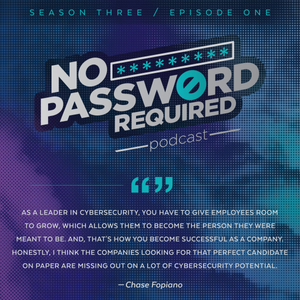
Chase Fopiano - a kindhearted former police officer who embodies all the qualities of a great leader
No Password Required
01/28/22 • 66 min
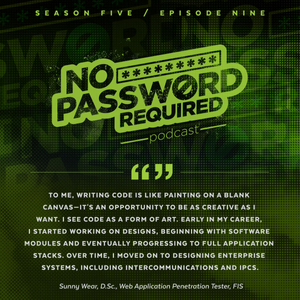
No Password Required Podcast Episode 54 — Dr. Sunny Wear
No Password Required
12/10/24 • 51 min
summary
In this episode, the conversation begins with a significant data breach at Star Health Insurance, affecting over 31 million individuals. The discussion delves into the complexities of insider threats, particularly focusing on the alleged involvement of the company's CISO. The episode transitions to an introduction of Dr. Sunny Ware, a web application penetration tester, who shares her journey from software development to cybersecurity. Dr. Sunny discusses her role in penetration testing, the importance of understanding application logic, and the use of AI in her work. The episode concludes with a lifestyle polygraph segment, where Dr. Sunny shares personal insights and experiences, emphasizing the importance of mentorship in cybersecurity.
takeaways
- Star Health Insurance experienced a major data breach affecting millions.
- Insider threats are predicted to be a significant risk in 2025.
- Dr. Sunny Ware transitioned from software development to cybersecurity.
- Understanding application logic is crucial in penetration testing.
- AI can be a valuable tool in penetration testing.
- Bug bounty programs offer focused opportunities for security testing.
- Mentorship is important for the next generation of cybersecurity professionals.
- Dr. Sunny emphasizes the creativity involved in coding and security.
- Vulnerability disclosure programs differ from bug bounty programs.
- Dr. Sunny's passion for teaching and sharing knowledge is evident.
titles
- The Star Health Insurance Data Breach: A Deep Dive
- Insider Threats: The New Face of Cybersecurity Risks
- Meet Dr. Sunny Ware: A Cybersecurity Trailblazer
- The Art of Penetration Testing with Dr. Sunny
- Exploring AI's Role in Cybersecurity
sound bites
- "Star Health Insurance suffered a significant data security incident."
- "There's a hacker and then there's this kind of cool insider twist."
- "The alleged hackers claimed that Star Health's CISO facilitated the breach."
- "Insider threats are going to be the risk to prepare for in 2025."
- "I came from very humble beginnings."
- "I think coding is like making a painting on a blank canvas."
- "I want to capitalize on the experience I already have in web API."
- "I use AI almost every day on every pen test."
- "I actively do bug hunting."
- "I want to make sure that if there's anything I can share to help."
chapters
00:00 Data Breach at Star Health Insurance
06:06 Insider Threats and Whistleblowers
07:05 Introduction to Dr. Sunny Ware
30:14 Dr. Sunny's Career Path and Penetration Testing
37:00 Lifestyle Polygraph with Dr. Sunny
48:55 Key Takeaways and Closing Thoughts
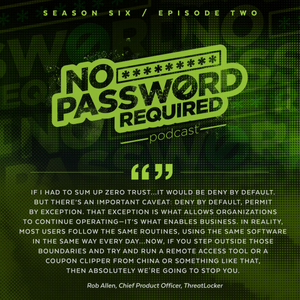
No Password Required Podcast Episode 57 — Rob Allen
No Password Required
03/17/25 • 46 min
keywords
cybersecurity, zero trust, public speaking, ThreatLocker, AI threats, layered security, Rob Allen, cybersecurity insights, personal growth, industry challenges, technology, wearables, Buc-ee's, sports, DIY, tech addiction, Vision Pro, personal achievements, American culture, cybersecurity
summary
In this episode of the No Password Required podcast, host Jack Klabby engages with cybersecurity experts Kaylee Melton and Rob Allen, discussing Rob's journey to ThreatLocker, the importance of overcoming public speaking fears, and the principles of Zero Trust security. They explore common mistakes organizations make when implementing Zero Trust, the future of cybersecurity in relation to AI threats, and the public's perception of cybersecurity incidents. The conversation also touches on the significance of layered security approaches and personal experiences in the industry, culminating in a fun lifestyle polygraph segment. In this engaging conversation, the speakers delve into their personal tech addictions, particularly focusing on extravagant purchases like the Vision Pro. They explore the future of wearable technology and its integration into daily life. The discussion shifts to the uniquely American experience of visiting Buc-ee's, a gas station that offers much more than fuel. They also debate the joy derived from sports victories versus personal achievements like hitting a hole in one. Finally, the conversation wraps up with a humorous take on the challenges of mastering DIY skills.
takeaways
- Rob Allen's journey from engineer to Chief Product Officer at ThreatLocker showcases career growth in cybersecurity.
- Public speaking can be daunting, but practice and experience help overcome fears.
- Zero Trust is a mindset focused on security, not just a product to buy.
- Organizations often hesitate to adopt Zero Trust due to misconceptions about efficiency.
- Inertia is a major obstacle for companies considering Zero Trust implementation.
- AI can be a double-edged sword in cybersecurity, used for both protection and attacks.
- Many smaller cybersecurity incidents go unreported compared to major breaches.
- Layered security should involve diverse approaches, not just similar detection tools.
- Stress in the workplace can be managed by adopting a laid-back mindset.
- Mentorship plays a crucial role in personal and professional development. Some people have good addictions and some have bad ones.
- The Vision Pro is an expensive but amazing piece of tech.
- Wearable technology is becoming increasingly common.
- Buc-ee's is a unique and quintessentially American experience.
- Experiencing a sports win can be as joyful as personal achievements.
- DIY skills can be both challenging and rewarding.
- Tech purchases often lead to guilt and reflection.
- The future of wearables may include more practical and stylish designs.
- Personal experiences shape our views on technology and culture.
- Mastering DIY can lead to greater independence and satisfaction.
titles
- Tech Addictions: The Price of Innovation
- The Future of Wearables: Are We Ready?
- Buc-ee's: A Journey into American Culture
- Sports Wins vs. Personal Achievements: What Brings More Joy?
Sound Bites
- "It's a process, you know, start somewhere."
- "Deny by default, permit by exception."
- "Zero Trust is not a product. It's a mindset."
- "The beauty of Zero Trust is it's not reactive."
- "AI is just as likely to be used against you."
- "I am never going to be that guy."
- "Buc-ee's is the most American thing ever."
- "I would very much like to have a hole in one."
- "I would like to be good at DIY."
Chapters
00:00 Introduction to Cybersecurity Insights
03:05 Rob Allen's Journey to ThreatLocker
05:49 Overcoming Public Speaking Fears
08:55 Understanding Zero Trust Security
12:12 Common Mistakes in Zero Trust Implementation
15:02 The Future of Zero Trust and AI Threats
18:05 Public Perception of Cybersecurity
21:08 Layered Security Approaches
24:02 Personal Experiences and Lessons Learned
26:58 Lifestyle Polygraph and Fun Questions
27:11 Tech Addictions and Unnecessary Purchases
32:05 The Future of Wearable Technology
34:08 Experiencing Buc-ee's: The Most American Gas Station
36:44 Joyful Moments: Sports Wins vs. Personal Achievements
39:03 Mastering DIY Skills: A Personal Journey
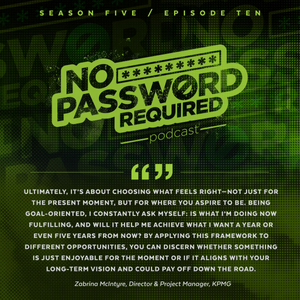
No Password Required Podcast Episode 55 — Zabrina Mcintyre
No Password Required
12/30/24 • 42 min
Summary
This conversation explores the U.S. Army's investment in cybersecurity compliance for small businesses, the importance of mentorship in the defense industry, and the unique career path of Sabrina McIntyre at KPMG. Sabrina discusses her transition from art to cybersecurity, the challenges of navigating compliance standards, and her advocacy for women in the field. The episode also touches on the intersection of art and cybersecurity, the vision for a cybersecurity museum, and fun personal insights from Zabrina's life.
Takeaways
- The U.S. Army is investing in small business cybersecurity compliance.
- Certification programs can help defense contractors meet compliance.
- Creating a secure environment for small businesses is essential.
- Mentorship programs are crucial for small business growth.
- Zabrina's career path showcases the value of diverse experiences.
- Understanding compliance standards like PCI DSS is challenging but necessary.
- Being open to new opportunities can lead to fulfilling career paths.
- Women in Cybersecurity is making strides in community building.
- Creativity is important in the cybersecurity field.
- Cybersecurity education should be accessible to all.
titles
- Investing in Cybersecurity for Small Businesses
- Navigating Compliance in the Cybersecurity Landscape
- Zabrina McIntyre: A Unique Career Journey
- Empowering Women in Cybersecurity
Sound Bites
- "Certification program for defense contractors"
- "Largest federal government mentor-protege program"
- "Cybersecurity maturity model is crucial"
- "Be your own best advocate in your career"
- "If you can see it, you can be it"
- "We need more creative people in cybersecurity"
- "Cybersecurity should be accessible to everyone"
- "Umbrellas don't work in Seattle"
Chapters
00:00 Introduction to the Next Generation Commercial Operations Program
02:51 The Importance of Cybersecurity Compliance for Small Businesses
05:45 Zabrina McIntyre's Role at KPMG
08:54 Zabrina's Unique Career Path
11:51 Navigating Cybersecurity Standards
14:48 Advice for Aspiring Cybersecurity Professionals
17:58 Women in Cybersecurity: Building Community
20:59 The Intersection of Art and Cybersecurity
24:04 Zabrina's Vision for a Cybersecurity Museum
27:02 Lifestyle Polygraph: Fun Questions with Zabrina
30:09 Key Takeaways and Closing Thoughts
Show more best episodes

Show more best episodes
FAQ
How many episodes does No Password Required have?
No Password Required currently has 62 episodes available.
What topics does No Password Required cover?
The podcast is about Coding, Cloud, Information Security, Code, Infosec, Ai, Data, How To, Software, Network Security, Cloud Computing, Windows, Podcasts, Anonymous, Big Data, Technology, Developer, Education, Internet, Business, National Security, Data Privacy, Networking, Python, Cybersecurity and Network.
What is the most popular episode on No Password Required?
The episode title 'No Password Required Podcast Episode 50 — Tanya Janca' is the most popular.
What is the average episode length on No Password Required?
The average episode length on No Password Required is 55 minutes.
How often are episodes of No Password Required released?
Episodes of No Password Required are typically released every 28 days.
When was the first episode of No Password Required?
The first episode of No Password Required was released on Nov 7, 2019.
Show more FAQ

Show more FAQ
